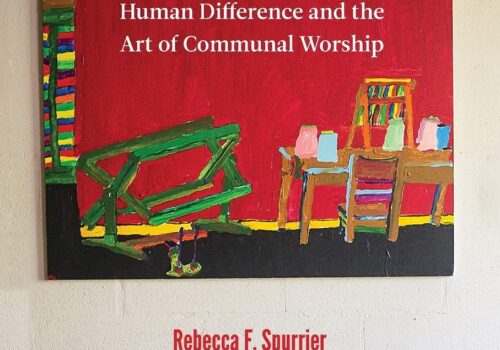Download PDF: RV Serrán-Pagán, The Origins of War
By Matthew A. Shadle
Washington, D.C.: Georgetown University Press, 2011. 256 pages. $29.95.
Matthew A. Shadle raises an important question sometimes overlooked by contemporary Catholic thinkers, namely, the origins of war. Why do nations come into conflict with each other? For Shadle, Catholic intellectuals of the past century have failed to address why humanity resorts to war. The book is divided in three major parts. First he examines the biblical, patristic, and medieval teachings on the origins of war used by leading Church theologians from the early fathers (Tertullian, Origen, Justin, and Irenaeus) to Augustine, John of Salisbury, Aquinas, and Dante. For Aquinas, human nature and divine grace must be integrated in the theological and moral response to questions of war and peace. For the Dominican thinker, human nature is the source of morality, but it can only be fulfilled by God’s grace. Then Shadle explores early modern and contemporary responses to the origins of war through the lenses of such influential thinkers as William of Ockham, Nicholas Machiavelli, Desiderius Erasmus, Juan Luis Vives, Francisco de Vitoria, Francisco Suarez, Thomas Hobbes, John Locke, Jeremy Bentham, Immanuel Kant, and Karl Marx. Once he has traced the historical sources in Western theology and philosophy on the origins of war, Shadle introduces the major contemporary approaches to international relations theory (classical realism, liberalism, and socialism). The last part of the book offers a critique of these theories by introducing constructivism as an alternative to the three classical theories, claiming that this new theory is closer to a Catholic worldview and is consistent with the Christian tradition of war and peace. In doing so, Shadle presents an array of modern and contemporary Catholic thinkers who are employing historical methods and socially constructed models in their theological frameworks. Among these thinkers we find Bernard Lonergan, Henri de Lubac, Karl Rahner, Jacques Maritain, John Courtney Murray, Dorothy Day, Pope John XXIII, Pope Paul VI, Pope John Paul II, Bryan Hehir, and George Weigel. In the conclusion, Shadle explains with more clarity why he thinks constructivism provides a more adequate Catholic response to questions of war and peace. In brief, Shadle’s constructivist theory provides the framework to develop the sort of culture that will make the right moral choices when faced with the difficult decision of when to wage a war and how to respond to it.
Shadle’s thesis is that modern and contemporary Catholics have overlooked new political theories, like constructivism, that take into account cultural norms as possible explanations for the origins of war. The importance of constructivism, however, is that it provides an alternative to both realism and liberalism. Constructivists such as Nicholas Onuf, John Finnemore, and George Wendt stress the socially constructed character of international relations. For Catholics, the constructivist position has its relevance in the fields of contemporary theology, ethics, philosophy, and politics, because this theory may be compatible with the social teachings of the Church. Contrary to realists who claim that power politics is given by nature (a materialist view), constructivists view the structure of international relations in terms of societal processes (an ideational view). Thus war is not inevitable or ingrained in nature, but it can be transformed through human practice. Whether we agree or disagree with his main thesis, it is left for each reader to accept or reject the value that this theory holds for political theorists and theological ethicists.
As a philosophy and religious studies scholar, I find his interdisciplinary approach stimulating and convincing. However, I am not sure if the constructivist theory that he holds so dearly could be the answer to the problem that he sees ignored or overlooked by modern Catholic thinkers, namely, the origins of war. As he pointed out throughout the book, Pope John XXIII and other modern Catholic thinkers understood that the root of war was fear and ignorance. I am surprised that Shadle did not use Thomas Merton and other contemporary Catholic thinkers who wrote on the question of war and peace. Merton, often regarded as an absolute pacifist, was in favor of just war theory, tracing his ideas back from St. Augustine to St. Thomas Aquinas and up to our days after the Second Vatican Council. Merton constantly searched for a creative synthesis where the natural law and the divine law established by Aquinas and superseded by Suarez and others will be taken into consideration. But their limitations and flaws need to be addressed particularly in the historical context of nuclear warfare. Only in this sense can we say with certainty that Merton was an absolute pacifist.
Shadle’s selection of Catholic thinkers was appropriate from the ancient biblical and patristic period to medieval and even to modern times with the rise of humanistic thinkers like Erasmus, but he felt short of mentioning other big names in contemporary Catholic circles. He could have spent more time elaborating on in-depth responses from other leading Catholic voices in America and abroad on the question that he just raised: the origins of war. Furthermore, his treatment of Day was vague. Shadle condemns her because of her association with the supernatural and otherworldliness approach that she inherited from the Lacouture retreat movement, namely, the retreats given by Fr. Pacifique Roy and Fr. John Hugo (128-129). Yet, precisely one of the major characteristics of the Catholic Worker movement and in particular of Dorothy Day was her down-to-earth approach to all questions of life. I am not sure why Shadle attempts to associate her later thoughts on the origins of war with people that she respected and admired, like he also did by linking her to her earlier Marxist years.
In sum, Shadle’s book will make a good contribution to the academic world and to contemporary Catholic circles due to his vast knowledge of how the Catholic tradition addresses the spiritual root cause of waging wars and his comprehensive knowledge of international relations theories, especially the theory of constructivism. Shadle’s limitations are not entirely his fault. We know that each book must be highly selective and his omissions are probably due in nature to his urgent message on the need to be well-informed on new international relations theories, especially the use of constructivism as the most compatible tool for a Catholic worldview. Yet this worldview itself is totally unclear based on the diversity of schools of thought within the history of the Catholic Church. Perhaps Shadle needs to write a new book on this topic.




